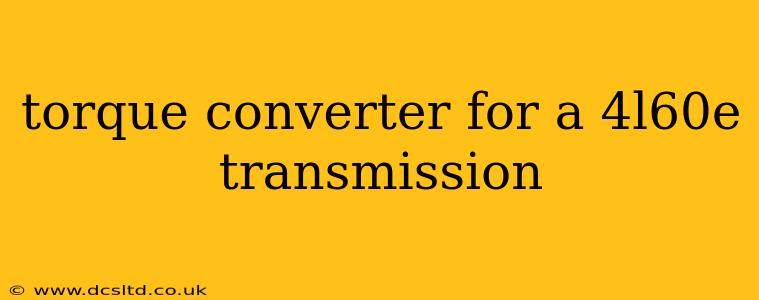The 4L60E transmission, a ubiquitous automatic transmission found in countless General Motors vehicles, relies heavily on its torque converter for smooth operation and efficient power transfer. Understanding the torque converter's role and choosing the right one for your specific needs is crucial for optimal performance and longevity. This guide delves into the intricacies of 4L60E torque converters, addressing common questions and providing valuable insights for both enthusiasts and professionals.
What is a Torque Converter?
A torque converter is a fluid coupling that acts as an intermediary between the engine and the transmission. Unlike a direct mechanical connection like a clutch, it uses hydraulic fluid to transmit power, allowing for smooth starts and gear changes. It's essentially a sophisticated hydraulic pump that multiplies engine torque, enabling the transmission to handle varying loads and speeds efficiently. The 4L60E, being an automatic, relies entirely on its torque converter for this crucial function.
What are the Different Types of Torque Converters for a 4L60E?
Several types of torque converters are available for the 4L60E, each offering different performance characteristics:
-
Stock/OEM Torque Converters: These are the standard converters that come with the transmission. They offer a balance of performance and longevity but may not be optimal for modified vehicles or those seeking enhanced performance.
-
High-Stall Torque Converters: These converters increase the engine's RPM before engaging the transmission, resulting in quicker acceleration and improved throttle response. The higher stall speed means the engine revs higher before the torque converter "locks up," providing a more aggressive driving experience. The stall speed is measured in RPM and is a key specification.
-
Performance Torque Converters: These are designed for modified vehicles with increased horsepower and torque. They often incorporate higher-quality materials and improved designs to withstand the increased stress. They may feature tighter tolerances for improved efficiency and reduced slippage.
-
Lower Stall Torque Converters: While less common for performance applications, these converters offer improved fuel economy and smoother operation at lower speeds, ideal for towing or situations where reduced engine strain is desired.
What is the Stall Speed of a Torque Converter?
The stall speed is the engine's speed at which the torque converter remains fully unlocked and spins freely. A higher stall speed means the engine will rev higher before the torque converter fully engages. This impacts acceleration and overall driving feel. The optimal stall speed depends on the vehicle's application and modifications. A higher stall speed isn't always better; too high a stall can lead to excessive wear and tear, especially in stock vehicles.
How Do I Choose the Right Torque Converter for My 4L60E?
Selecting the appropriate torque converter depends on several factors:
-
Engine Modifications: Highly modified engines require torque converters capable of handling increased horsepower and torque. Choosing an insufficient converter can lead to premature failure.
-
Driving Style: Aggressive drivers might benefit from higher stall speed converters for quicker acceleration, while those prioritizing fuel economy may prefer lower stall speed options.
-
Towing Capacity: Towing requires a torque converter that can handle significant loads. In this case, a properly chosen converter with a focus on durability is paramount.
-
Budget: Torque converters vary significantly in price, so setting a budget is essential.
What are the Signs of a Failing Torque Converter?
Several signs indicate a failing 4L60E torque converter:
- Slipping: The transmission may slip or hesitate during acceleration.
- Shuddering: A shuddering sensation during acceleration or while driving at constant speed.
- Loud Noises: Unusual noises, such as whining or banging from the transmission area.
- Overheating: The transmission may overheat more frequently than usual.
- Rough Shifting: Experiencing jerky or harsh shifts.
How Much Does a Torque Converter for a 4L60E Cost?
The cost of a 4L60E torque converter varies widely depending on the type and brand. Stock replacements are relatively inexpensive, while high-performance converters can be considerably more costly. Prices can range from a few hundred to over a thousand dollars.
Can I Install a Torque Converter Myself?
While technically possible, installing a torque converter for a 4L60E is a complex procedure best left to experienced mechanics. Improper installation can lead to transmission damage or injury. Specialized tools and knowledge are required. Consider professional installation to ensure proper function and to avoid costly mistakes.
This guide provides a comprehensive overview of 4L60E torque converters. Remember to consult with a transmission specialist to determine the best converter for your specific needs and vehicle modifications. Proper selection and installation are crucial for optimal performance, longevity, and safe operation.
